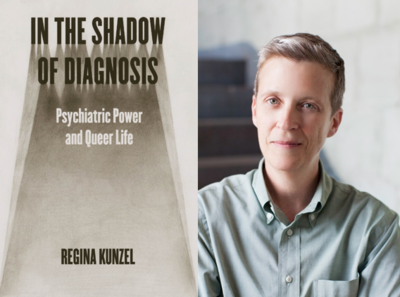In the Shadow of Diagnosis: Psychiatric Power and Queer Life
 “In the Shadow of Diagnosis is a wrenching, utterly compelling, beautifully argued book that could not be more urgent or timely. Innovative in multiple ways – in thinking disability and queer theory together, in restoring concern with gender non-conformity to the history of sexuality, and with a uniquely precious source base that shows how those deemed ‘sick’ spoke back to the diagnosing physicians – Kunzel demonstrates that the encounter between psychiatry and queerness was transformative for both.” – Dagmar Herzog, Distinguished Professor of History and the Daniel Rose Faculty Scholar at the Graduate Center, City University of New York
“In the Shadow of Diagnosis is a wrenching, utterly compelling, beautifully argued book that could not be more urgent or timely. Innovative in multiple ways – in thinking disability and queer theory together, in restoring concern with gender non-conformity to the history of sexuality, and with a uniquely precious source base that shows how those deemed ‘sick’ spoke back to the diagnosing physicians – Kunzel demonstrates that the encounter between psychiatry and queerness was transformative for both.” – Dagmar Herzog, Distinguished Professor of History and the Daniel Rose Faculty Scholar at the Graduate Center, City University of New York
The University of Chicago Press, 2024
Beginning in the mid-twentieth century, psychiatrists diagnosed homosexuality as a mental disorder, one they claimed to be able to treat and “cure.” That stigmatizing diagnosis sanctioned larger structures of discrimination and cast a stigmatizing pall over gay men, lesbians, and gender non-conforming people for decades. It also granted psychiatrists tremendous authority, underwriting psychiatry’s collaborations with the U.S. state and strengthening its carceral apparatus. Drawing on a collection of previously unexamined case files from Saint Elizabeths Hospital, In the Shadow of Diagnosis explores the significance of the encounter between psychiatry and queer and gender-variant people. It examines psychiatrists’ investments in understanding homosexuality as a dire psychiatric condition and the methods they used to attempt to “cure” it, and argues that those claims were essential to the expansion of psychiatric power and authority in the mid-twentieth-century U.S. It also explores the encounter of gay men, lesbians, and gender variant people with psychiatry from the position of people positioned as patients, arguing that stigma of diagnosis constituted a formative condition of queer life and politics.
Regina Kunzel is the Larned Professor of History and Professor of Women’s, Gender, and Sexuality Studies